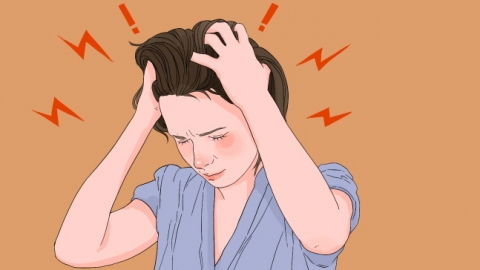What causes irritability, short temper, and throwing things?
Being easily irritable, agitated, or throwing objects may be caused by sleep deprivation, excessive stress, hyperthyroidism, manic episodes, or anxiety disorders. These symptoms can be improved through catching up on sleep, psychological adjustment, and medication. If symptoms persist or worsen, or are accompanied by insomnia or abnormal weight changes, prompt medical attention is recommended.
1. Sleep Deprivation: Chronic late nights or poor sleep quality impair the brain's neurological regulation, reducing emotional control and increasing irritability over minor issues. It is advised to maintain a regular sleep schedule, ensuring 7–8 hours of sleep per night, and avoid using electronic devices before bedtime.
2. Excessive Stress: Prolonged work or life pressure leads to continuous mental tension, causing negative emotions to accumulate, resulting in irritability and agitation, and even destructive behaviors such as throwing things. Stress can be relieved through physical exercise or talking with others; managing tasks more effectively can also help reduce burdens.

3. Hyperthyroidism: Excessive secretion of thyroid hormones accelerates metabolism and affects the nervous system, leading to emotional excitability, irritability, palpitations, excessive sweating, and weight loss. Under medical guidance, medications such as methimazole tablets, propylthiouracil tablets, and propranolol sustained-release tablets may be used to alleviate symptoms.
4. Manic Episode: Neurotransmitter imbalances in the brain cause abnormally elevated mood, manifesting as irritability, aggression, impulsive destruction of objects, rapid speech, increased energy, and reduced need for sleep. Patients may take lithium carbonate sustained-release tablets, sodium valproate sustained-release tablets, or olanzapine tablets under medical supervision to relieve symptoms.
5. Anxiety Disorder: Chronic anxiety disrupts emotional regulation, leading to irritability and anger triggered by excessive worry, sometimes expressed through destructive acts like throwing objects, along with feelings of tension, chest tightness, and insomnia. Under a doctor’s guidance, medications such as sertraline tablets, paroxetine tablets, or buspirone tablets can help improve symptoms.
Maintain a regular sleep schedule and balanced diet, engage in outdoor activities to divert attention, learn emotional regulation techniques such as deep breathing, communicate frequently with others, and cultivate a calm mindset to reduce impulsive behaviors.







